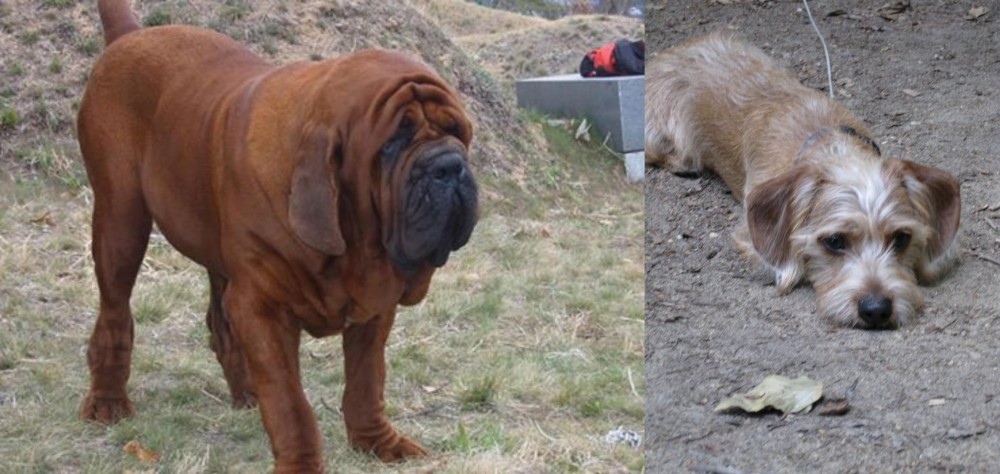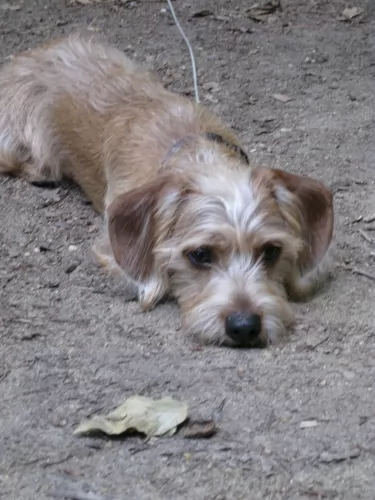 Petzlover
Petzlover Korean Mastiff is originated from South Korea but Schweenie is originated from United Kingdom. Korean Mastiff may grow 26 cm / 11 inches higher than Schweenie. Korean Mastiff may weigh 65 kg / 144 pounds more than Schweenie. Korean Mastiff may live 3 years less than Schweenie. Both Korean Mastiff and Schweenie has almost same litter size. Korean Mastiff requires Moderate Maintenance. But Schweenie requires Low Maintenance
Korean Mastiff is originated from South Korea but Schweenie is originated from United Kingdom. Korean Mastiff may grow 26 cm / 11 inches higher than Schweenie. Korean Mastiff may weigh 65 kg / 144 pounds more than Schweenie. Korean Mastiff may live 3 years less than Schweenie. Both Korean Mastiff and Schweenie has almost same litter size. Korean Mastiff requires Moderate Maintenance. But Schweenie requires Low Maintenance
 This large breed dog is also known as the Mee Kyun Dosa. In spite of his huge size, he isn’t aggressive at all and is bred to be a companion dog.
This large breed dog is also known as the Mee Kyun Dosa. In spite of his huge size, he isn’t aggressive at all and is bred to be a companion dog.
He was originally developed to be a working dog. The dog was developed in the late 1800’s from European and Asian working breeds. Those interested in dog breeds suspected that a crossing of the Japanese Tosa-Inu with the Neapolitan Mastiff and the Dogue de Bordeaux brought about the breed. They also thought that the Saint Bernard and English Mastiff were brought in later on as well.
These large molosser dogs have been developed through years of inbreeding. It is one of the biggest dogs in Korea.
 The Schweenie is a hybrid dog, with the parent breeds being the Shih Tzu and the Dachshund.
The Schweenie is a hybrid dog, with the parent breeds being the Shih Tzu and the Dachshund.
The Schweenie dog has been around for about 4 decades when breeders were looking for a dog that would be free of the health issues of the purebred parent breeds.
Because the Schweenie is a mix breed, it doesn’t qualify to be part of the American Kennel Club. He is however recognized by the Designer Breed Registry and some other clubs.
 You can’t help but stare at the Korean Mastiff because of his strong, muscular neck of loose skin that forms dewlaps. His face is wrinkled and he has a cumbersome, sluggish gait.
You can’t help but stare at the Korean Mastiff because of his strong, muscular neck of loose skin that forms dewlaps. His face is wrinkled and he has a cumbersome, sluggish gait.
He is a large dog standing at anything between 59 to 76cm in height, both male and female. He can weigh between 65 to 74kg. He is noticeable because of his fairly loose fitting coat, which is short and smooth and which is a rich, shiny reddish, orange or brown colour.
The nose of the dog is broad and dark, the ears soft and floppy and he has eyes which are set wide apart.
The Korean Mastiff is reserved with strangers but he is friendly and even tempered with his human family, making an ideal pet.
He is looked upon as a gentle giant, being an oversized playmate for children and he also tolerates other pets in the home.
He isn't an overly energetic dog, but that doesn't mean he shouldn't be exercised. He will need long walks to avoid him putting on weight.
 The Schweenie will be a smallish dog standing at roughly 27cm to 50cm and weighing 4 – 9kg.
The Schweenie will be a smallish dog standing at roughly 27cm to 50cm and weighing 4 – 9kg.
Because of the Dachshund parent, he will likely have a long body. The coat is shortish to medium length and can be a variety of colors – from a rusty color to brown, black, grey and even a cream shade. The ears are floppy and the tail medium length.
He is a small dog who is smart and bright and who wants to please his human owners. He loves people and wants to be around them and involved in their activities.
Small and cute though he is, he can be a stubborn dog and become a little big aggressive too if he is feeling a bit moody. He will need to be trained and socialized if you want him to obey your simple commands such as sit, stay, lie down and come.
He is intelligent enough to learn these simple commands with ease.He is both alert and vigilant, and this makes them good watchdogs.
 Your huge Korean Mastiff is a good natured dog who isn’t aggressive. He loves being with his human family and makes a particularly good pet when he has been trained and socialized.
Your huge Korean Mastiff is a good natured dog who isn’t aggressive. He loves being with his human family and makes a particularly good pet when he has been trained and socialized.
He likes a firm but fair owner who takes a leader-of-the-pack role. In spite of his largeness and sluggishness, he can be quite agile and makes a good watchdog too.
All round, the Korean Mastiff, known as a gentle giant, is capable of making you a splendidly friendly, loving canine companion.
 The Schweenie can be somewhat reserved and they need exercise regularly as well. If they don’t get enough exercise, they tend to become jittery and this can make them become a bit snappy. The are more prone to be snappy and aggressive with children who haven’t been taught how to treat animals gently and with respect.
The Schweenie can be somewhat reserved and they need exercise regularly as well. If they don’t get enough exercise, they tend to become jittery and this can make them become a bit snappy. The are more prone to be snappy and aggressive with children who haven’t been taught how to treat animals gently and with respect.
They’re small enough to adjust to life in the city or countryside but will still need to be exercised.
The little Schweenie, with the right kind of owner can become a great little pet and companion.
 Treat your big Mastiff dog like the wonderful fur-child he is and make sure your attend to all his medical needs to avoid pain and discomfort for him.
Treat your big Mastiff dog like the wonderful fur-child he is and make sure your attend to all his medical needs to avoid pain and discomfort for him.
Cherry eye is a fairly common health issue with this breed. It affects the tear gland of the third eyelid, and if left untreated, can lead to ongoing eye problems.
All dogs have a third eyelid, as well as two tear producing glands to lubricate the eyes. Its an important protective component to eye health in dogs. When the connective tissue that holds the gland in place is damaged or weak, there is a red protrusion of the gland from the lower eye. This is a congenital disorder. Don’t ignore it, but get your pet to the vet so you can catch it early.
Canine bloat, known as gastric dilatation and volvulus can be a killer disease for your pet, more so with deep-chested, large breeds.
Gas accumulation is known as bloat, and its the accumulation of gas which can cause the stomach to rotate. A dog can go into shock from bloat. The reason for this is that the stomach expands, putting pressure on veins. Blood can’t flow as it should and the blood supply gets cut off to the stomach.
Your dog could be vomiting, restless, the stomach hard and bloated or he may be drooling. Dogs who gobble their food down and eat just one large meal a day have an increased susceptibility to GDV than other dogs.
The wrong ingredients of a dog’s diet can also contribute to bloat. High quality food and feeding your pet smaller meals can help.
 With good care, your Schweenie can live to be 12 to 15 years of age. Every dog, no matter how healthy, can get some of the health problems that plague many dogs.
With good care, your Schweenie can live to be 12 to 15 years of age. Every dog, no matter how healthy, can get some of the health problems that plague many dogs.
This is where the cushions between each vertebra come into contact with the spinal cord. It can result in nerve damage and sometimes even paralysis. Because the Shih Tzu is one of the parent breeds, you will need to be aware of this ailment as these dogs are more susceptible to this disease.
Hypoglycemia is fairly common in small dogs and it is where there is a drop in blood sugar. It can be brought on by stress. It can also be referred to as low blood sugar and it can be deadly. If your pet is hypoglycemic, you will notice a loss in appetite, extreme lethargy, trembling and unusual behavior. You will need to get your Schweenie to the vet immediately for tests and treatment.
 A Korean Mastiff is an easy dog to groom with his short smooth coat. He is a moderate shedder so a brush twice a week will be sufficient to maintain the shiny, smooth condition of his coat.
A Korean Mastiff is an easy dog to groom with his short smooth coat. He is a moderate shedder so a brush twice a week will be sufficient to maintain the shiny, smooth condition of his coat.
Because the dog has lots of skin and folds, these folds will need to be washed and kept clean as grime can collect.
While you're busy attending to his skin check his nails too and check inside and outside his ears for signs of redness and irritation.
Puppies use up more energy than mature adults, requiring a diet of good quality protein. Dogs that have been spayed or neutered will require less calories as will senior dogs.
Korean Mastiffs require high quality nutrition, and if its dry kibble, make sure its the best brand. Mix in some home-made food such as cooked chicken, brown rice and vegetables from time to time as well as some raw meat occasionally.
Protein and fat from good sources are top ingredients for your Korean Mastiff. Avoid food with allergens such as corn and wheat, sweeteners, preservatives and colorants.
Make sure your large pet has constant access to fresh water.
 Your Schweenie will need to be brushed at least twice a week to rid him of loose hairs. Because of his floppy ears, you will need to clean them and check for redness. If you don’t like the idea of probing inside the ear, professional groomers or the vet will do it for you.
Your Schweenie will need to be brushed at least twice a week to rid him of loose hairs. Because of his floppy ears, you will need to clean them and check for redness. If you don’t like the idea of probing inside the ear, professional groomers or the vet will do it for you.
Trim his nails if they don’t wear down on their own.
Provide him with a nice dry, warm spot to sleep.
Provide him with nice chewy toys that will keep him occupied.
Exercise him every day. Taking him on walks and playing ball games with him will keep him fit and trim but also help with staving off boredom.
Ensure his vaccines against deadly diseases are up to date. See that he gets to the vet when he appears to be under the weather.
He is a small dog so you have to be careful about how you feed him. You need to feed him a nutrient-rich dry kibble. Read the packaging and buy dog food according to his size, age and activity levels.
Try and include some home-made food into your dogs diet. A little bit of boiled chicken, brown rice or pasta, sweet potatoes, carrots and spinach all chopped up will do him good and can be added into the dry kibble twice a week. Some raw meat should also occasionally be added in as this can help to prevent some skin problems. Be sure that cool, fresh water is available for your pet at all times.